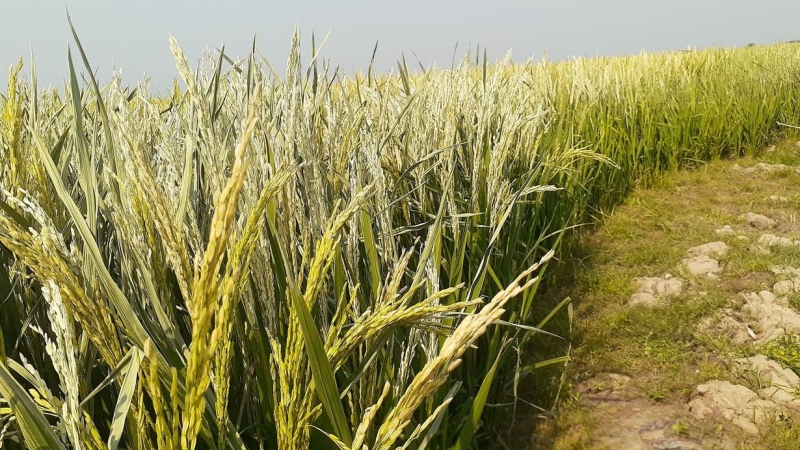- CA Yunus pays homage to Liberation War martyrs on Victory Day |
- Bangladesh capital market extends losing streak for second day |
- Bangladesh celebrates Victory Day Tuesday |
- 'Different govts presented history based on their own ideologies': JU VC |
Severe Heatwave, Drought Threaten Boro Rice Production

Bangladesh’s largest rice-producing season, the Boro season, plays a pivotal role in ensuring national food security. However, this year, the sector faces unprecedented challenges, with severe heatwaves and prolonged drought threatening the country’s ability to meet production targets. Experts, agricultural workers, and farmers are closely monitoring the situation, as these harsh weather conditions could lead to significant yield reductions.
The Bangladesh Rice Research Institute (BRRI) has been tracking the Boro crop, reporting that production is generally good. Yet, intense heatwaves sweeping across parts of the country have raised alarms. The lack of rainfall combined with soaring temperatures has led to fears of scorched crops, which could severely damage the harvest. Farmers have been urged to carefully manage their fields to avoid water shortages, as these could amplify the effects of the extreme heat. In addition, the risk of rice plant diseases, such as blast, looms large if the dry conditions persist.
Despite these challenges, there is some relief. In areas like Netrokona and parts of northern Bangladesh, early varieties of Boro rice are being harvested, offering a potential buffer against further weather-related damage. Fields in these regions appear in relatively good condition, with farmers cautiously optimistic that rainfall in the coming days could alleviate the situation. If the weather holds, these regions may still achieve a solid harvest.
Particularly in northern Bangladesh, including Raiganj in Sirajganj, farmers have reported healthy crops that have reached full bloom. Local farmers express hope for a bumper harvest, provided there are no additional storms or extreme weather disruptions.
However, concerns remain over continuing dry conditions. In regions like Sirajganj, farmers like Paltan Kumar in Chandaikona Purbapara are increasingly relying on irrigation, which is straining resources and increasing costs. Not all farmers have access to sufficient water, which has become a critical issue amid the ongoing drought.
In Netrokona, where the haor wetlands are crucial for rice cultivation, the harvest has begun in five out of ten upazilas. However, with forecasts predicting a return of the heatwave, local agricultural officers have advised farmers to act swiftly and harvest early to mitigate the damage. Early reports from Madan and Khaliajuri upazilas, including farmers such as Sadek Mia, Bidhan Aditya, and Palash Mia, suggest that early harvesting has helped reduce the risk of crop loss.
The Department of Agricultural Extension (DAE) has set an ambitious target of 22.6 million tons of Boro rice from 50 lakh hectares of land. Despite the setbacks caused by the heatwave and drought, the DAE remains optimistic, contingent on improved weather conditions.
In response to the situation, the government and agricultural bodies have urged farmers to adopt protective measures. The Bangladesh Rice Research Institute (BRRI) has been working with experts to provide guidance on managing the impact of the extreme weather.
Dr. Khalequzzaman, Director General of BRRI, expressed cautious optimism, noting that while the current weather poses challenges, it is still too early to conclude that production will fall below expectations. He emphasized that similar concerns had arisen in previous years, but the outcome had been better than anticipated.
However, international observers like the U.S. Department of Agriculture (USDA) have raised concerns. The USDA's report on world agricultural production suggests that Bangladesh’s rice output could decline by as much as 400,000 tons due to both the heatwave and reduced paddy cultivation areas. The USDA’s forecast underscores the vulnerability of Bangladesh’s agricultural system, especially as the country relies heavily on a single cropping season.
As the situation unfolds, experts acknowledge that Bangladesh may fall short of its Boro rice production target. The unpredictable weather patterns, characterized by insufficient rainfall and soaring temperatures, could stunt plant growth, lower yields, and increase the risk of disease, including rice blast.
Boro rice is crucial to Bangladesh’s food security and economic stability. Any disruption in production could have far-reaching consequences, particularly amid the country’s ongoing economic challenges, inflation, and rising population.
In light of the ongoing heatwave and drought, the government is focusing on strengthening irrigation infrastructure, improving weather forecasting, and providing more extensive support for farmers to cope with the climate challenges.
Looking to the future, experts emphasize the need for more resilient agricultural practices, including drought-resistant crop varieties and improved disaster preparedness strategies. With the possibility of rainfall in the coming days, there is hope that the Boro crop will recover. However, it is clear that Bangladesh must adapt its agricultural policies to the realities of climate change, ensuring the country’s food production remains stable in the years ahead.

